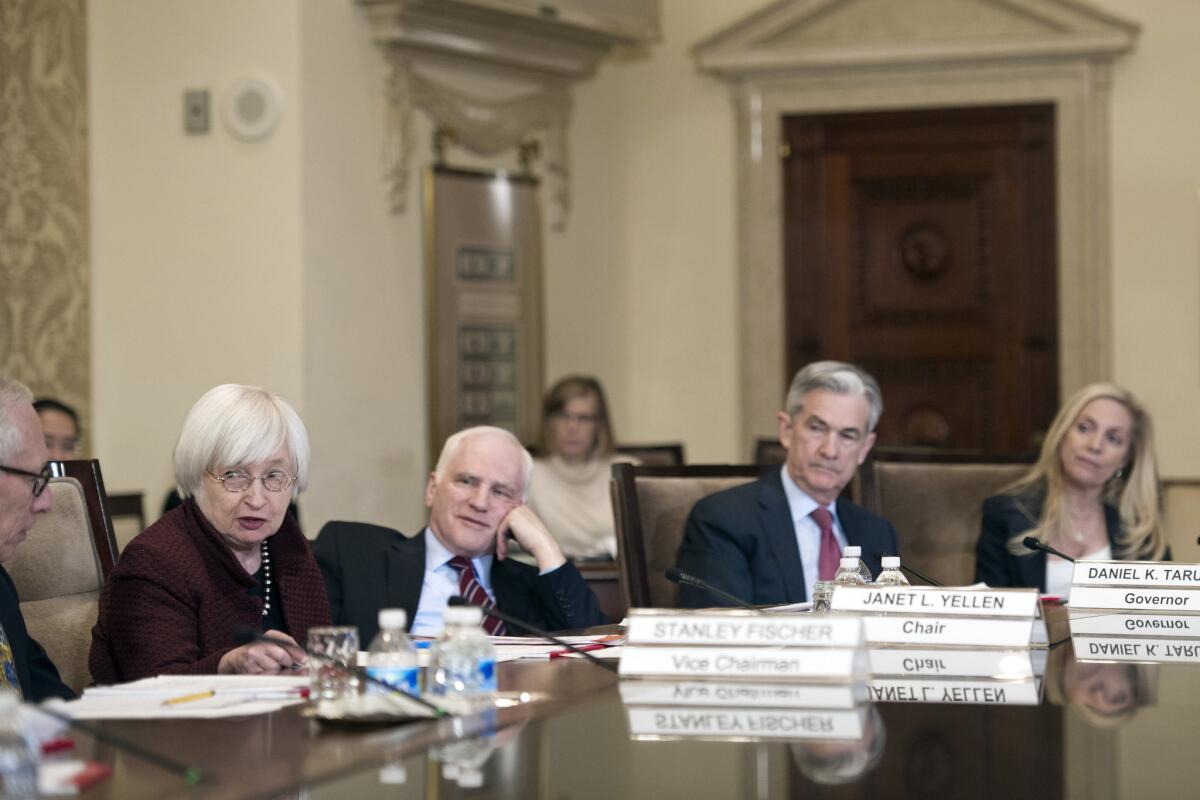The pressure’s on the Federal Reserve to make a diverse pick for Atlanta post

Federal Reserve Chairwoman Janet L. Yellen, second from left, oversees a meeting of the central bank’s Board of Governors in Washington on Dec. 15. Some lawmakers and advocacy groups have complained the Fed board and its regional bank presidents lack racial and ethnic diversity.
Reporting from Washington — The selection of a regional Federal Reserve bank president normally takes place in relative obscurity, followed only by local business leaders, financial executives and analysts who track monetary policy.
But amid concerns about a lack of diversity at the highest levels of the nation’s central banking system, great attention is being focused on who will be chosen as the next head of the Federal Reserve Bank of Atlanta.
The search is being watched closely by members of Congress and advocacy groups that have complained publicly in recent months that the Fed’s top leadership is nearly all white.
The Atlanta region, which has a large African American population, presents the perfect opportunity to start changing that, they said.
“This would be historic,” said Rep. Maxine Waters (D-Los Angeles), who would like the Fed to make the next Atlanta chief the first African American to lead one of the 12 regional banks. “It would be very important, and it’s long overdue.”
As the Fed has taken on a larger role in the economy in the wake of the Great Recession, the lack of racial and ethnic diversity among key decision-makers has sparked concerns that monetary policy decisions haven’t taken into account the higher unemployment rates among African Americans and Latinos.
“Communities of color have not yet experienced full economic recovery,” said Shawn Sebastian, field director of Fed Up, a campaign by labor, community and liberal activist groups that wants the Fed to enact pro-worker policies.
“As a really important economic policymaker, the Fed needs to actually reflect America,” he said.
Leading African American lawmakers have called on Fed Chairwoman Janet L. Yellen, the first woman to lead the central bank, and the Atlanta Fed to conduct a broad search.
Fed officials have promised to do that. But they’ve made no commitment to a diverse appointment for a complex job that includes overseeing about 1,700 employees in the Atlanta region and participating in monetary policy deliberations in Washington.
During an October webcast on the search, Tom Fanning, chairman of the Atlanta Fed’s board of directors, was asked whether the bank had “a special opportunity” to break the regional bank “color barrier.”
“That would be a great thing. We’re all for it,” he said. “We want the best person as well.”
The U.S. labor force’s guy problem: Lots of men don’t have a job and aren’t looking for one »
Fanning, chief executive of Atlanta-based energy firm Southern Co., is leading the bank’s search committee. The committee is reviewing candidates and doesn’t have a timetable for a decision, Atlanta Fed spokeswoman Jean Tate said.
The five sitting members of the Board of Governors and 11 of the 12 regional bank presidents are white. Since the central bank was created in 1913, three African Americans have served as governors, but there have been no Latinos. There never has been an African American or Latino regional Fed president.
“They just need more diversity,” Waters said.
Regional Fed presidents rotate onto the Federal Open Market Committee, where they join Fed governors in setting the level of a key interest rate that affects business and consumer loans.
The committee has started nudging up the rate as the unemployment rate has fallen below 5%. But many liberals are worried the job market isn’t fully healed, pointing to higher unemployment rates for African Americans and Latinos.
Last spring, Waters was among 116 House members and 11 senators who wrote to Yellen criticizing what they called “the disproportionately white and male” leadership at the central bank.
“Given the critical linkage between monetary policy and the experiences of hardworking Americans, the importance of ensuring that such positions are filled by persons that reflect and represent the interests of our diverse country, cannot be understated,” said the letter, organized by Rep. John Conyers (D-Mich.) and Sen. Elizabeth Warren (D-Mass.).
At congressional hearings, lawmakers have pushed Yellen to do more to improve diversity among the regional bank chiefs.
The president nominates Fed governors, who must be confirmed by the Senate. Yellen and her colleagues on the Board of Governors give final approval for regional bank president selections, which are made by the board of directors of each bank.
“It’s our job to make sure that every search for those jobs assembles a broad and diverse group of candidates,” Yellen told Rep. David Scott (D-Ga.) last winter after he pressed her to consider “getting an African American, for the first time in history, to be a regional president of a Federal Reserve bank.”
That was before Atlanta Fed President Dennis Lockhart announced his resignation in September, effective Feb. 28.
Shortly afterward, Waters, the top Democrat on the House Financial Services Committee, joined Conyers, Scott and Rep. John Lewis, another Georgia Democrat, in writing to Yellen and Fanning urging the Fed to “consider candidates from diverse personal backgrounds, including African Americans, Latinos and women.”
How Trump could use the presidency to help his own business interests »
The letter said that “grave racial disparities exist across our nation in unemployment wages and income.” It also said that the unemployment and poverty rates for African Americans in the Atlanta region — Alabama, Florida, Georgia and parts of Louisiana, Mississippi and Tennessee — were about double those for whites.
For the first time, the Atlanta Fed’s search committee has asked the public to submit names of potential candidates. The Atlanta Fed also has tried to make the process more transparent by posting details on its website, including holding the October webcast in which Fanning answered the public’s questions.
Asked about the importance of diversity for addressing “the special concerns of minority communities,” Fanning said he thought the Fed already did a good job on the issue, but “increasing our cultural bandwidth” was important.
“It is incumbent upon the person that gets this job to have the broadest perspective possible,” he said. “That’s why valuing diversity is really a critical component here.”
Follow @JimPuzzanghera on Twitter
ALSO
The era of super-low interest rates might be ending. What’s in it for you?
Trump’s victory could spell the end of the FCC’s net neutrality regulations
Trump hammered the Federal Reserve as a candidate. As president, he could quickly reshape it
More to Read
Inside the business of entertainment
The Wide Shot brings you news, analysis and insights on everything from streaming wars to production — and what it all means for the future.
You may occasionally receive promotional content from the Los Angeles Times.










